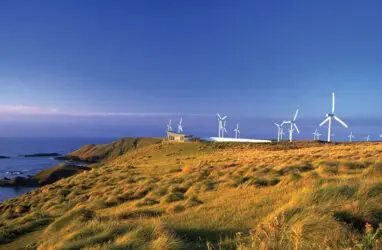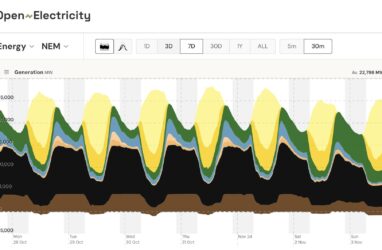Feed aggregator
Exploring the extraordinary potential (and avoiding the pitfalls) of your local Buy Nothing group
Thousands of blue-clad protesters join London march for clean water
More than 130 organisations take part in protest demanding government action over country’s sewage crisis
Thousands of blue-clad protesters have told the government to “stop poisoning Britain’s water” as they marched through London calling for action on the country’s contaminated coastal waters and rivers.
A coalition of more than 130 nature, environmental and water-sport organisations called supporters out on to the streets of the capital on Sunday afternoon, aiming to create the country’s biggest ever protest over water.
Continue reading...Labour MPs push back against anti-pylon lobbying despite local opposition
Letter by 61 Labour MPs supports ‘cheapest and most pragmatic’ plan for new electricity infrastructure
More than 60 Labour MPs have formed a bloc to push back against anti-pylon lobbying by Conservative and Green MPs, saying they back plans to build the pylons despite local opposition in several areas.
MPs, particularly in rural areas, have come under mounting pressure from anti-pylon activists to oppose the infrastructure. The Tories found themselves forced to commit to hold a “rapid review” of overhead pylons in their July manifesto.
Continue reading...Argentine carbon markets bill centres national registry, empowers regulator
Panama imposes moratorium on forest carbon projects
My mother nursed a life-affirming 25-year grudge. Hard as I try, I don’t have the attention span | Zoe Williams
It turns out long-held resentments exist even in the animal kingdom. Does that mean they hold an evolutionary advantage?
The best thing that happened to me during the whole of the pandemic was a story on the internet. An Oregon resident, furloughed, saw on a daytime nature documentary that, if you fed crows, they would bring you small gifts. Curious, they tried it, and were delighted to find themselves in effective possession of a 15-strong crow family – but then things took a dark turn. The crows became an army, fiercely protective of their leader’s property. If neighbours came near, the crows would dive-bomb them. “To be clear,” the person wrote on Reddit, “they’re not aggressive 100% of the time. If just the neighbours are out [on their own porch], they are friendly, normal crows. They only get aggressive when someone gets close to me or my property.”
It’s such a lovely phrase, “friendly, normal crows”; it’s just a pity that it’s an oxymoron. Crows are the most prodigious grudge-holders, which a professor of wildlife at Washington University, John Marzluff, discovered by capturing seven of the birds while wearing an ogre mask in 2006. A full 17 years later, crows were still regularly attacking him. Even if you were to query the ethics of his original experiment, you’d have to admit that he paid a high price. How such a thing is possible when the lifespan of a crow is only 12 years is this: not only can they hold a grudge, they can also pass it on to one another. Originally, even birds that witnessed the ogre-trap attacked Marzluff, then over time they transmitted the hostility to their offspring, creating a multigenerational grudge.
Zoe Williams is a Guardian columnist
Continue reading...Australia’s best performing wind and solar farms in October
The post Australia’s best performing wind and solar farms in October appeared first on RenewEconomy.
‘We didn’t realise how hard it is’: small farmers in Europe struggle to get by
Brutal economic situation has inflicted misery on farmers who struggle to turn a profit and forced some to look for alternative streams of revenue
When Coen van den Bighelaar first spoke to school friends about taking over their parents’ dairy farms, he was the only one of the four to voice serious doubts. Fresh out of university, he was making more money in a comfortable office than his father did toiling for twice as long in the field.
But six years later, Bighelaar has followed in his parents’ footsteps, while his friends’ enthusiasm has waned. One quit farming to take a job in logistics. Another opened a daycare centre to supplement the income from selling milk. A third is thinking about buying land and moving to Canada.
Continue reading...Revealed: billionaires are ‘ultimate beneficiaries’ linked to €3bn of EU farming subsidies
Thousands of small farms have closed according to analysis of official but opaque data from EU member states
The European Union gave generous farming subsidies to the companies of more than a dozen billionaires between 2018 and 2021, the Guardian can reveal, including companies owned by the former Czech prime minister Andrej Babiš and the British businessman Sir James Dyson.
Billionaires were “ultimate beneficiaries” linked to €3.3bn (£2.76bn) of EU farming handouts over the four-year period even as thousands of small farms were closed down, according to the analysis of official but opaque data from EU member states.
Continue reading...Developers quietly shed solar generation to focus on battery only projects
The post Developers quietly shed solar generation to focus on battery only projects appeared first on RenewEconomy.
Australia reaches record monthly renewable share of 47.4 per cent
The post Australia reaches record monthly renewable share of 47.4 per cent appeared first on RenewEconomy.
William returns to 'special place' Africa for prize awards
COP16: UN biodiversity talks cut short amid delegate departures, but scores successes
Politicians not ambitious enough to save nature, say scientists
Robot retrieves radioactive fuel sample from Fukushima nuclear reactor site
Plant’s owners hope analysis of tiny sample will help to establish how to safely decommission facility
A piece of the radioactive fuel left from the meltdown of Japan’s tsunami-hit Fukushima Daiichi nuclear power plant has been retrieved from the site using a remote-controlled robot.
Investigators used the robot’s fishing-rod-like arm to clip and collect a tiny piece of radioactive material from one of the plant’s three damaged reactors – the first time such a feat has been achieved. Should it prove suitable for testing, scientists hope the sample will yield information that will help determine how to decommission the plant.
Continue reading...US students score win in push for fossil fuel divestment by private high schools
Concerned students press for their high schools – some with $1bn endowments – to reinvest in clean energy
A high school in California has decided not to invest in coal, oil or gas, instead pledging to put money into clean energy. It’s the latest win in a new fossil fuel divestment campus campaign launched by high schoolers across 11 countries that is gaining support in the US.
The Nueva School, an elite private school outside San Francisco, pledged in spring 2024 to invest a portion of its $55m endowment in renewable power. The commitment followed months of pressure from students.
Continue reading...Toxic PFAS in menstrual pads harms reproductive health, advocates says
California lawsuit demands Carefree and parent company Edgewell remove chemicals or add warning label
Carefree menstrual pads are contaminated with toxic PFAS “forever chemicals”, which presents a threat to the reproductive health of women using the products, a new lawsuit filed in California state court alleges.
The suit demands Carefree and its parent company, personal care product giant Edgewell, remove PFAS from the products or put a warning label on its packaging.
Continue reading...‘You have to disguise your human form’: how sea eagles are being returned to Severn estuary after 150 years
Use of bird hand-puppets to rear young among innovative methods unveiled as part of project to restore species
Sea eagles were last seen soaring over the shimmering mud flats and brackish tidal waters of the Severn estuary more than 150 years ago. Now wildlife charities have unveiled innovative plans to bring the raptor back to the estuary, which flows into the Bristol Channel between south-west England and south Wales, by 2026.
“Sea eagles used to be common in these regions. But they were wiped out through human persecution,” says Sophie-lee Williams, the founder of Eagle Reintroduction Wales, which is leading the project. “We strongly believe we have a moral duty to restore this lost native species to these landscapes.”
Continue reading...‘Welfare for the rich’: how farm subsidies wrecked Europe’s landscapes
The steep and stark environmental decline was not supposed to happen under the common agricultural policy
The Rhine overflowed last winter, covering fields miles from the river and in some places leaving just the tops of trees visible.
But Thomas Bollig, who farms just a few miles from the banks of the Rhine, was not worried. Even as floods inundated the fields of his neighbours, making sowing impossible, his holdings were largely unaffected. Bollig farms organically, and the natural methods he uses to improve his soil allow his fields to hold more water when it rains, and release it gradually, coping well with floods and droughts.
Continue reading...





